Rikken is a trick-taking game which is played in certain areas of the Netherlands. The game has some similarities to other games like Solo Whist which also feature a number of differing contracts which can be bid and played. The game is designed for play by four participants. Although each player plays individually, certain bid types feature temporary partnerships, either formed amongst the bidders, the defenders, or both. Rikken is played using one standard 52 card deck. The ranking of the cards as used for this game are as follows, from highest to lowest: Ace, King, Queen, Jack, 10, 9, 8, 7, 6, 5, 4, 3, 2.
Determination of first dealer and player seating positions can be performed in a variety of ways, with a draw for high cards a method commonly used. Using this method, each player draws one card from the face-down shuffled deck. The player who draws the highest card has the first choice of seats and is set as the first dealer. Each additional player then takes their seat of choice (of the remaining seats) in the order of cards drawn, from high to low. If two or more players draw a card of the same rank, those cards should be set aside and new cards drawn. After each hand, the role of dealer rotates in a clockwise direction around the table.
Once the first dealer has been determined and the players seated, he gathers the cards in the deck together and offers the deck to the player at his right to cut. A unique feature of this game is that the cards are never shuffled between hands, but simply gathered together in a face-down pile and cut by the player at the current dealer's right. After the cut, the dealer then begins dealing the cards. He first deals each player (starting with the player at his right and continuing in a clockwise direction around the table) a packet of seven cards, and then after each player has been dealt this seven card packet, he then deals each player a six card packet.
After the cards have been fully distributed in the deal, the players pick up their hands and a round of bidding occurs. The player to the immediate left of the dealer has the first bid, and the bidding continues around the table in a clockwise direction until a bid has been followed by three consecutive passes (except in the special case of the Misère and Piek bids, see below). A player who passes must continue to pass at each turn during the bidding on this same hand. If a player opts to bid, his bid must be higher than any previous bid on the current hand. The following shows the legal bids that can be made, as well as their relative ranking (from lowest to highest):
| Bid Ranking | Bid Name | Bid Description |
|---|---|---|
| 1 | Rik | 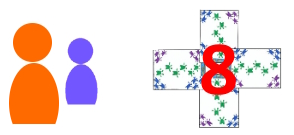 Rik is the lowest bid, and is a bid by that player undertaking to win at least 8 tricks. He will also have the assistance of
one other player. This player is determined by the player announcing a
specific Ace (of which the bidder does not have in his hand), and which the
player having the specifically called Ace will become that player's temporary partner for that hand. The bidder
is also entitled to name one of the four suits to be set as the trump suit for that hand.
Rik is the lowest bid, and is a bid by that player undertaking to win at least 8 tricks. He will also have the assistance of
one other player. This player is determined by the player announcing a
specific Ace (of which the bidder does not have in his hand), and which the
player having the specifically called Ace will become that player's temporary partner for that hand. The bidder
is also entitled to name one of the four suits to be set as the trump suit for that hand. |
| 2 | Rik Beter | This is a bid by a player to win at least 8 tricks during the hand. He will have the assistance of one other player, which is determined by calling out a specific Ace (by rank and suit) which that player does not have in hand, and the other player having that Ace then becomes his temporary partner for that hand. The suit of hearts is always set as trump in a bid of Rik Beter. |
| 3 | 8 Alleen (Solo 8) | A bid of 8 Alleen is a bid to win a minimum of 8 tricks, playing without the aid of any other player (playing Solo). The player making this bid may later name a trump suit of his choice for the hand. |
| 4 | Misère | 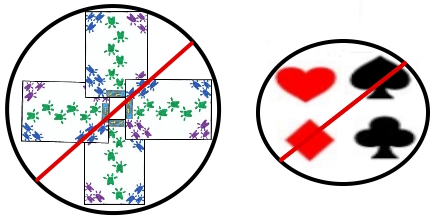 This is a bid by a player to win no tricks during that hand. The bidder plays without the aid of a partner and there will be no trump suit set or used for the hand.
This is a bid by a player to win no tricks during that hand. The bidder plays without the aid of a partner and there will be no trump suit set or used for the hand. |
| 4 | Piek | A bid of Piek is a bid to win exactly one trick. The bidder will play alone (no partner) and there is no suit set as trump for the hand. |
| 5 | 9 Alleen (Solo 9) | This is a bid to win nine or more tricks during the hand. The bidder will play alone and selects a trump suit of his choice before play begins. |
| 6 | 10 Alleen (Solo 10) | 10 Alleen is a bid to win ten or more tricks during the current hand. The bidder plays alone and selects a trump suit of choice to be used during this hand. |
| 7 | 11 Alleen (Solo 11) | 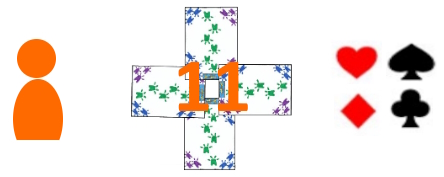 This is a bid to win 11 or more tricks during the hand. The bidder will play alone and selects a trump suit of his choice for use during the hand.
This is a bid to win 11 or more tricks during the hand. The bidder will play alone and selects a trump suit of his choice for use during the hand. |
| 8 | 12 Alleen (Solo 12) | A bid of 12 Alleen is a bid to win 12 or more tricks during the hand. The bidder plays alone and selects a trump suit of his choice for use during this hand. |
| 9 | Open Misère | This is a bid to win zero tricks during the hand. The player will play alone and there is no trump suit set during the hand. After the first trick has been completed, the high bidder of this bid must then place his entire remaining hand face up on the table for all to see. |
| 9 | Open Piek | Open Piek is a bid to win exactly one trick during the hand. The player will play alone, with no trump suit being set for the hand. After the first trick has been completed, the high bidder of this bid must put his entire hand face-up on the table in view of every player. |
| 10 | Treola (Triple Ace) | 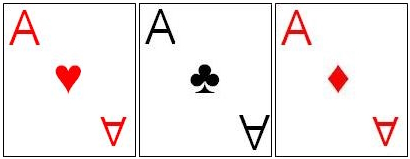 This bid may only be made by a player who has exactly three Aces in his hand. This is a bid to win a minimum of 8 tricks during the hand. Whichever player has the fourth Ace will become this player's partner during this hand. Before start of play
to the first trick, the player having this fourth Ace thus announces this
fact and declares the suit to be set as the trump suit for this hand.
This bid may only be made by a player who has exactly three Aces in his hand. This is a bid to win a minimum of 8 tricks during the hand. Whichever player has the fourth Ace will become this player's partner during this hand. Before start of play
to the first trick, the player having this fourth Ace thus announces this
fact and declares the suit to be set as the trump suit for this hand. |
| 11 | Open Misère Met Een Pratje | This is a bid made by a player to win zero tricks during the hand. He plays alone, and no trump suit is set for the hand. After the first trick has been completed, every player must then place their entire hand face-up on the table for all players to see. The opposing players to the bidder may discuss amongst themselves what cards to play from their exposed hand on their turns. |
| 11 | Open Piek Met Een Pratje | This is a bid by a player to win exactly one trick during the entire hand. The bidder plays alone with no trump suit set for that hand. After the first trick has been completed, all players place their hands face-up on the table for all players to see. The opponents may discuss amongst themselves what cards they should play during the hand. |
| 12 | 13 Alleen (Solo 13) | The bidder undertakes to win all 13 tricks during the hand. He will play alone, but may declare his choice of trump suits to be used during that hand. |
| 13 | Open 13 Alleen (Open Solo 13) | This is the highest allowable bid, and is a bid to win every trick during the hand. The player must play alone but may set a trump suit of his choice to be used for the hand. After the first trick has been completed, the high bidder places his entire, remaining hand face-up on the table for the other players to see. |
As will be noticed the bids of "Misère" and "Piek" are considered bids of equal rank. Similarly, the bids of "Open Misère" and "Open Piek" are equal as are the bids "Open Misère Met Een Pratje" and "Open Piek Met Een Pratje". Thus, it is permissible for multiple players to make either of these bids on the same round of bidding. While normally, there may only be one high bidder, with these equal bids, as long as there is not a higher bid by another player, there may be multiple such bidders. For example, say one player bids "Misère" and two others bid "Piek", and no players bid higher, all three of these bids would be valid and each of these bidders would be a considered a high bidder for that hand.
If all four players pass in the first round of bidding, the cards are all thrown in, gathered (but not shuffled) and dealt by the next dealer in turn (after the mandatory cut by the player at that dealer's right).
After a high bidder (or bidders in the case of the various Misère and Piek bids) has been determined, play of the hand can begin. If the bid player made a bid that allowed the call of a trump suit, he would declare the trump suit to be used for that hand. In a bid of Rik and Rik Beter, the trump suit as declared cannot be the same as the suit of the Ace called for to determine a partner for that hand, and in a winning high bid of Treola, the trump suit announced cannot be the same suit as the Ace the bidder did not have in hand.
Immediately after the trump suit is determined (if appropriate for that hand), if the player is entitled to call for a partner (as per the specific high bid) he would then do this. In a bid of Rik or Rik Beter, he would thus call an Ace by suit, and whichever player has that Ace would then be set as that player's partner. However, that player does not make any indication that he is the player who thus has that Ace, however it will later become apparent once that card is played to a trick. In calling an Ace, the player must have at least one card in the called Ace's suit. If the only Aces he does not have in hand are in suits he also does not have, he must follow his Ace call with the statement "blind", indicating this fact to the other players. If a player bidding Rik or Rik Beter has all four Aces in hand, he may instead call out a King of a suit that he does not currently have in hand.
A player who has three Aces in hand, must, on his first bid, make a bid of Treola (or higher) on his turn to bid, unless another player has already made a higher bid. In a winning high bid of Treola, that bidder announces the suit of the missing Ace, and whichever player has that Ace, then announces the trump suit, which can be his choice of trump suits for the hand.
Once the partners (if any) are called, and the trump suit (if appropriate for the bid type) is announced, actual play can begin. The player to the dealer's left leads the first card to the first trick.
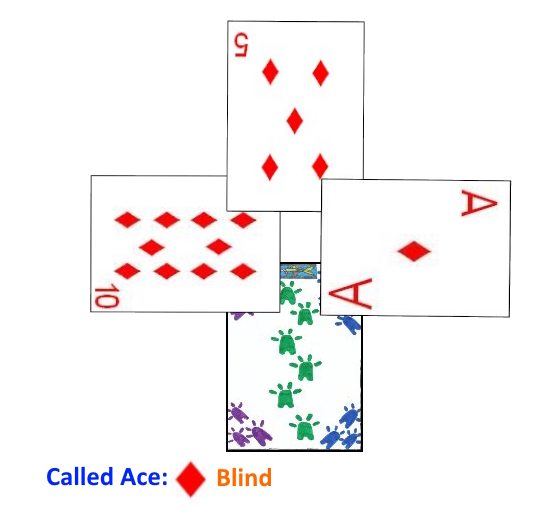 The leader to a trick may play any card of choice to start a trick. Each other player, in a clockwise direction around the table then plays a card, in turn, to the same trick. If the player has a card of the same suit as originally led to the trick, he must play it. If he has no such card, he may play any card of choice from his hand, including a card from the designated trump suit for that hand.
The leader to a trick may play any card of choice to start a trick. Each other player, in a clockwise direction around the table then plays a card, in turn, to the same trick. If the player has a card of the same suit as originally led to the trick, he must play it. If he has no such card, he may play any card of choice from his hand, including a card from the designated trump suit for that hand.
If the suit of the called Ace is led to a trick by another player, the player with that Ace must then play that Ace to this trick (regardless of the cards played by the other players). If the Ace was called "blind", the bidder, on a trick to which he can lead, may play his card face-down (instead of the usual face-up play), and the other players, in turn must attempt to play a card of the called Ace's suit to this trick and the player with the called Ace must play that Ace to this trick. After each player has played to this trick, the led card is turned face-up. The trick is won by either the called Ace, or, if any player played a card of the trump suit to the trick, by the highest card of the trump suit so played to it. The bidder can only lead a trick once in this face-down manner, and then only if the missing Ace has not yet been played to any trick.
Other than this special trick, each other trick is won by the highest card of the trump suit played to it, or, if the trick contains no cards from the trump suit, the highest card of the suit originally led to that trick. Cards won in tricks should be set aside, face-down and out of play, and the winner of each trick leads the first card to the next trick.
After all tricks have been played and won, scoring on the hand then occurs. The scores earned (or lost) during the hand are based on the high bid. The following chart shows the scores for each bid, as well as potential additional points earned for tricks over the minimum needed for that bid:
| Contract Name | Base Scoring Value | Overtrick Bonus |
|---|---|---|
| Rik | 1 | 1 per Overtrick |
| Rik Beter | 1 | 1 per Overtrick |
| 8 Alleen (Solo 8) | 1 | 1 per overtrick |
| Misère | 5 | N/A |
| Piek | 5 | N/A |
| 9 Alleen (Solo 9) | 1 | 1 per Overtrick |
| 10 Alleen (Solo 10) | 1 | 1 per Overtrick |
| 11 Alleen (Solo 11) | 1 | 1 per Overtrick |
| 12 Alleen (Solo 12) | 1 | 1 per Overtrick |
| Open Misère | 10 | N/A |
| Open Piek | 10 | N/A |
| Troela | 2 | 1 per Overtrick |
| Open Misère Met Een Pratje | 15 | N/A |
| Open Piek Met Een Pratje | 15 | N/A |
| 13 Alleen (Solo 13) | 15 | N/A |
| Open 13 Allen (Open Solo 13) | 20 | N/A |
In the contracts which feature a partner, both the high bidder and the partner each earn the number of points indicated if the bid was successful. However, if the bid failed, all players opposing that player earn the Base score of that failed bid. In addition, some contract types allow, if the bid was successful, a number of additional points earned per each overtrick (tricks won by the player/partnership in excess of the number bid in the contract) are also earned, if applicable. Similarly, for a player (or partnership) that failed to make that particular bid, each opposing player earns one point for each trick for which the high bidders won fewer than that bid for. In bids of Rik, Rik Beter, Solo 8, Solo 9, Solo 10, Solo 11, and Solo 12, if the player (or his partnership, if applicable) manages to win every trick during the hand, they earn one additional point. In the special equal bids mentioned, in which multiple players can make the same bid, or bids of an equal value, points are won or lost based on each such bid made during that hand.
After a set number of hands, the player with the highest overall score is declared the game winner.
Variations and Optional Rules
Forced bid: In some games, the rule regarding what occurs if every player passes is modified. In this version, if the first three players pass, the fourth player, the dealer, must make any legal bid.
Special Games with No Bid: In other games, if all four players pass, instead of the cards tossed in, a special type of game is played. The following are some of the more common possibilities used when this optional rule is in play:
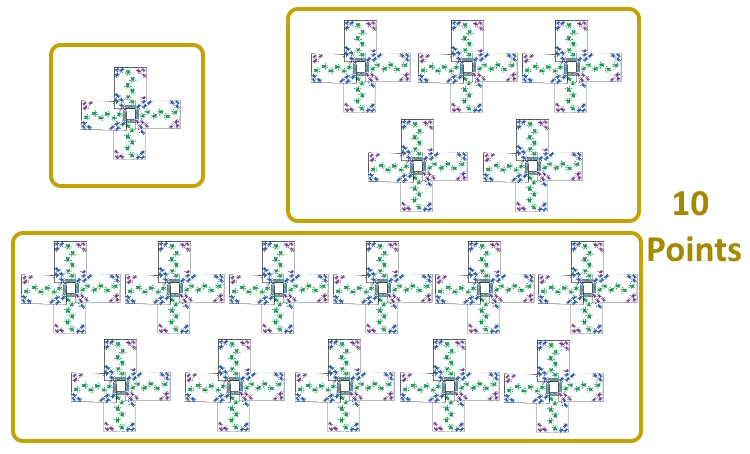
- 1 - 5 - 11 : In this special game, players attempt to win exactly one, exactly 5, or exactly 11 tricks during the hand. No trump suit is used during the hand and each player plays for himself. If no player manages to win 1, 5, or 11 tricks, no points are earned during the hand. Any player that manages to win 1, 5, or 11 such tricks earns 10 points.
- Mie En (Queens) : This game is played with each player playing individually and no trump suit set. Each player attempts to avoid winning tricks which contain one or more Queens. If every player took one Queen, no points are scored, if three players captured Queens during the hand, the player taking no Queens earns 20 points, if two players managed to capture no Queens, each player earns 10 points.
- Schuppen Mie (Queen of Spades) : This special game is played with each player playing for himself, and features no trump suit. During the hand, players attempt to avoid winning the Queen of Spades, and the last trick of the hand. Any player managing to win neither the Queen of Spades nor the last trick earns 10 points.
Five Player Rikken: Rikken is sometimes also played by five participants. This variant is played identically to the four hand variant, except the dealer in each hand, deals out four hands to the other remaining players, but receives no cards himself and does not score on that hand. As usual, the role of the dealer rotates around the table in a clockwise direction around the table.